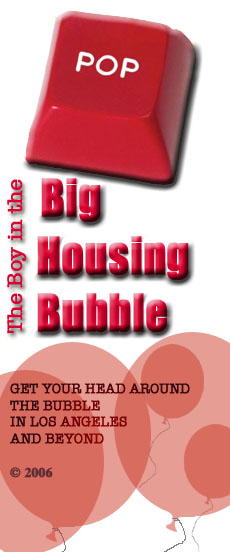Homeowners In Bubble Denial
Denial is, after all, the first reaction to a catastrophe.
"This can't be happening."
And so, it's not surprising that it's the response of many homewoners surveyed about the housing market by RBC Capital Markets, the corporate and investment banking arm of RBC Financial Group. In a non-bylined story in the Daily News Transcript, a sister publication of the Boston Herald out of Needham, MA, the study's results paint a potentially devastating picture — Many homeowners expect the value of their homes to rise 10 percent or more every year for the next few years!!!
Bubble or no, you can't deny that such gains are out of the realm of possibility.
Here's an excerpt from the Daily News Transcript:
Despite fears in the marketplace about a U.S. housing bubble, about 60 percent of homeowners expect the value of their homes to increase by at least 5 percent annually during the next several years, according to an online survey of 1,001 American consumers.Read the entire story at this link.
According to the survey findings, released by RBC Capital Markets, the corporate and investment banking arm of RBC Financial Group, 24 percent of respondents said they expect annualized gains of 10 percent or more over the next few years. About 3 percent of respondents said they expect their home values to decline over the next few years.
About 85 percent of homeowners who responded to the survey said they have experienced real estate gains over the last three years and over 70 percent experienced gains in excess of 10 percent during this timeframe, RBC announced.
Meanwhile, about 10 percent of the respondents said rising home values have affected their spending habits. And over half of those surveyed disagreed with the notion that real estate gains impacted their spending even though 51 percent either sold their home or borrowed against their home equity in some fashion. Ironically, those that disagreed most with the idea that real estate gains had impacted their spending were those in higher income brackets (defined as those making over $100,000) and those that had already experienced the biggest real estate gains, RBC reported.
Ultimately, these two groups were also the most aggressive in extracting equity (approximately 65 percent).
"Not only are most people expecting big real estate gains to continue, the vast majority of people don't believe these gains have impacted their spending. These opinions run contrary to most data in the marketplace regarding the real estate wealth effect," said Scot Ciccarelli, managing director of equity research for RBC Capital Markets.
"We believe these findings raise a major question. In our minds, the question is whether people have spent more freely than they otherwise would have because of their real estate gains and don't even recognize it. If that's the case, a simple slowing of real estate gains, not just a fall in housing prices, could have a significant adverse impact on spending patterns."
— The Boy in the Big Housing Bubble




<< Home